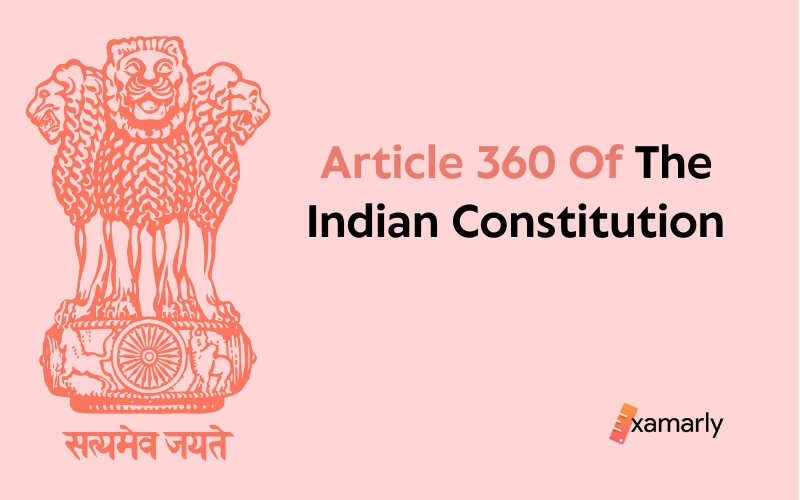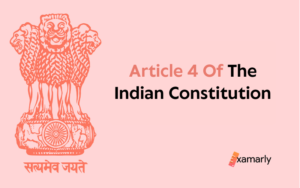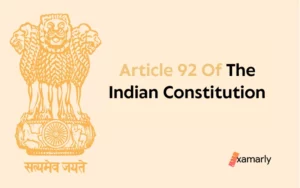The Indian Constitution recognizes the possibility of an economic threat in some circumstances, in addition to allowing for emergencies in cases when India’s security is threatened at the national and state levels. As a result, Article 360 of the Indian Constitution contains a provision that allows for the imposition of a financial emergency in the nation in the event of such an eventuality.
According to the provisions of Article 360 of the Indian Constitution, a Proclamation of Financial Emergency may be issued if the President of India has reasonable grounds for believing that a situation exists in which the financial stability of India or any portion of the country is jeopardized.
The 44th Constitutional Amendment Act of 1978, however, stipulates that the President’s “satisfaction” is subject to judicial scrutiny, so it’s vital to keep that in mind. To phrase it another way, the Supreme Court has the authority to evaluate the declaration of a financial emergency.
- What Is Article 360 Of The Indian Constitution?
- Financial Emergency And The Constitution
- Is Financial Emergency Under Judicial Review
- Parliamentary Approval And The Time Period Of Financial Emergency
- Effects of Financial Emergency
- The Possibility Of A Financial Emergency In Certain Circumstances
- Criticisms Of The Provision Of Financial Emergency
- Significance
- Conclusion
- FAQs On Article 360
What Is Article 360 Of The Indian Constitution?
Article 360 of the Indian Constitution provides for the imposition of a financial emergency to be declared in the country if an emergency crisis prevailed in India. Its provisions are as follows:
- If the President determines that a situation has developed that threatens the financial stability or credit of India or any portion of its territory, he may issue a proclamation declaring as such.
- A proclamation issued pursuant to clause (1)—
- (a) may be revoked or altered by a subsequent Proclamation;
- (b) shall be presented before each House of Parliament;
- (c) unless it has been authorized by resolutions of both Houses of Parliament before the end of that period, shall stop to be in effect at the end of two months:
With the caveat that if any such Proclamation is made at a time when the House of the People has been dissolved or if the dissolution of the House of the People occurs within the two-month period mentioned in subclause (c) and if a resolution approving the Proclamation has been approved by the Council of States but no resolution with regard to such Proclamation has been approved by the House of the People prior to the conclusion of that period the Proclamation will cease to be in effect thirty days after the House of the People reconvenes unless a resolution approving it has also been enacted by the House of the People before the end of the aforementioned thirty-day period.
- The executive authority of the Union extends to giving any State instructions to observe any canons of financial propriety that may be stipulated in the instructions during the time that any such Proclamation as is noted in clause (1) is in effect, as well as to the giving of any other instructions that the President may consider are essential and appropriate for the objective.
- Despite anything of this Constitution—
- (a) any such directive may include—
- (i) a provision needing the lowering of salaries and allowances for all or any class of persons serving in conjunction with a State’s affairs;
- (ii) a provision requiring all Money Bills or other Bills subject to the provisions of Article 207 to be reserved for consideration by the President after being passed by the State Legislature;
- (b) it shall be competent during the time that any Proclamation issued according to this article is in effect, the President shall have the authority to issue directives for the reduction of wages and allowances of all or any class of individuals serving in connection with the operations of the Union, including the judges of the Supreme Court and the High Courts.
- (a) any such directive may include—
Note: 38th amendment of the Indian Constitution inserted the 5th clause to article 360 with the retrospective effect which the 44th amendment of the constitution of India deleted.
Financial Emergency And The Constitution
A financial emergency is mentioned under Article 360 of the constitution. However, the constitution doesn’t specify any explicit grounds for a declaration of a financial emergency. It merely discusses the possibility of imposing a financial emergency in the event that any financial stability or credit condition is jeopardized. The authority to mandate the use of this emergency vest rests with the President, provided that such a move is recommended by the President’s Council of ministers. During the time when this choice is being deliberated by the government, the President’s role would be limited to serving as a rubber stamp. The choice, nevertheless, may be contested in court.
Is Financial Emergency Under Judicial Review
The 38th Amendment Act of 1975 made it so that the declaration of a financial emergency could not be contested in court.
The 44th Amendment Act of 1978 eliminated the clause added by the 38th Amendment Act of 1975, which suggests that the president’s satisfaction is subject to judicial review (that is, it can be challenged in court).
The financial emergency is presently being investigated by the courts.
Parliamentary Approval And The Time Period Of Financial Emergency
In accordance with the provisions of Article 360(2) of the Constitution of India, the proclamation of a state of financial emergency must be approved by both Houses of Parliament within a period of two months of its issuance.
If both Houses of Parliament agree, a financial emergency remains in effect until it is abolished.
There are two things that can be inferred from this:
- The continuation of it does not require further consent from the Parliament.
- There are no time constraints for the function of a financial emergency.
Effects of Financial Emergency
The Union assumes complete responsibility for the nation’s financial affairs after the parliament approves the emergency. It has the authority to give instructions to state governments on how to act on the financial issue.
Parliament has the authority to lower the wages and benefits of those employed by the Union or State Governments during the course of such an emergency.
After being approved by the state legislature, financial and money bills are subsequently forwarded to the president for review.
The President takes the Council of Ministers’ recommendations into consideration before making decisions.
In other words, the Union will decide what kinds of bills a state may pass.
Additionally, the government has the authority to lower the pay of all government officials across the entire nation.
Therefore, even if the workers are employed by some State Governments, they will not be exempt.
Additionally, it allows the government the authority to lower the pay for the Supreme Court and High Court justices as well as members of the armed forces.
On the other hand, this won’t have any impact whatsoever on the fundamental rights that the country’s residents enjoy.
The Possibility Of A Financial Emergency In Certain Circumstances
No financial emergency has ever occurred in India up until this point.
The Financial Crisis Of 1991
1991 was the year that saw India experience the most catastrophic economic crisis in its entire history.
The economy of India was in transition.
In the 1980s, there were substantial and escalating fiscal imbalances, which caused the financial crisis.
Governments at the federal and state levels both experienced considerable increases in their combined fiscal deficits.
The rupee was significantly devalued as a result of India’s inadequate foreign exchange reserves, which could only barely cover three weeks’ worth of imports. The value of the Indian rupee was subject to a substantial revaluation in the middle of the year 1991.
However, despite the extremely difficult circumstances that led India to the point of financial collapse, there was never a declaration of a state of financial emergency.
COVID-19
In a writ petition that was submitted as public interest litigation during the lockdown in March of 2020, the Center for Accountability and Systemic Change (CASC) asked that a financial emergency be declared as a result of the COVID-19 epidemic.
The argument, on the other hand, was shot down on the grounds that it is up to the President to determine whether or not a financial emergency actually exists.
The only person who can declare a financial emergency is the President, and the Supreme Court is the only body that can review such pronouncements. According to the petition:
Since the nation’s independence, COVID-19 has been the most pressing emergency in both the country and the world. Because of this, it requires a joint command between the Union and state governments in order to be managed in line with the legislation.
Criticisms Of The Provision Of Financial Emergency
One of the most fundamental problems with the law regarding financial emergencies is that, in contrast to other regulations, it does not identify what exactly constitutes a financial emergency.
Governments may benefit from using the broad definition of “financial instability.” The nation of India is governed by a federal system that devolves power to the central government.
Nevertheless, the authority of the state’s elected administrations is curtailed by this law.
They have a restricted capacity to make judgments that are in their own best interests.
In addition, the management of India’s economy falls under the purview of the central government.
Even the states that do the best would be required to shoulder the burden of the incompetence and inefficiency of the central government.
However, this particular provision has never been put into practice.
Significance
- One of the people who contributed to the creation of the Constitution, Dr. BR Ambedkar, provided an explanation for the inclusion of financial emergency provisions in the Constituent Assembly. He stated that “this article more or less follows the National Recovery Act, 1933 of the United States,” which provided the President of the United States with the authority to enact comparable provisions in order to assist the American people in overcoming the challenges that were brought on by the Great Depression of the 1930s.
- Financial emergency provisions allow for the easy avoidance of potentially catastrophic events like economic recessions and other types of financial crises.
Conclusion
In light of the severity of the financial crisis, these emergency financial provisions were enacted with the goal of preserving the Constitution’s integrity. Power amplification seeks to preserve the constitutional order rather than to undermine it. The National Government operates more effectively as a result of the Emergency Provisions. The responsibility of safeguarding the nation falls on the shoulders of the Union. In India, however, the law was never enforced in any way. Despite experiencing a serious financial crisis situation in 1991 and simultaneously battling famine and war in 1965, India never even made an attempt to utilize the provision.
It is detrimental to the nation’s reputation to declare that there is a financial emergency. As the head of the federal government, the President of India has delegated emergency powers in order to preserve the federal system that underpins the Union of India.
FAQs On Article 360
How Many Times Has The Nation Of India Declared A State Of Financial Emergency Up To This Point?
It has never been necessary to use Article 360 (Financial Emergency). However, in 1991, a balance of payment problem brought about an extremely close call for the declaration of a financial emergency. However, it was not announced at the time.
What is the most significant concern that the states have in relation to the declaration of a financial emergency?
It is feared that the President and Union Executive may engage in some type of constitutional dictatorship, which will result in the nullification of the State’s ability to function independently in terms of its finances.
How Simple Is It To Approve A Financial Emergency?
Only a simple majority (that is, a majority of the members of that house present and voting) is required in order for a resolution in either House of Parliament to approve the declaration of a financial emergency.
What Is The Financial Emergency Under Article 360 Of The Indian Constitution?
If the President of India believes that the financial stability of India or any portion of its territory is in danger, he has the authority under Article 360 of the Indian Constitution to issue a Proclamation of Financial Emergency. Therefore, if a situation develops in the country that leads to a financial crisis, the President of India may proclaim a state of emergency to handle the issue in order to get the situation under control. The 44th Amendment Act of 1978 makes it feasible for judicial review of financial emergencies.
How Many Types Of Emergency Are There Under The Indian Constitution?
A situation demanding quick action is what is meant by the term “emergency” in general. The Indian Constitution mentions three different kinds of emergencies:
1. National Emergency
2. Financial Emergency
3. State emergency (President’s rule)






